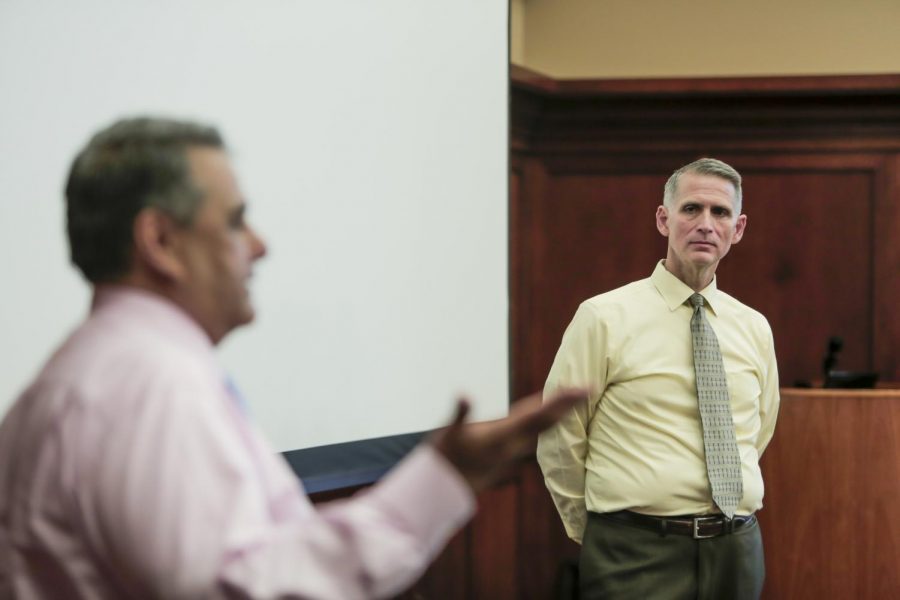Plaintiffs in Kentucky same-sex marriage case visit WKU
April 21, 2016
OUR KENTUCKY HOME
Greg Bourke and Michael DeLeon, the lead plaintiffs in Kentucky’s marriage equality case, visited WKU on Monday afternoon to share their 34-year-long story with students and faculty.
Bourke and DeLeon were married in Canada in 2004, the same year Kentucky made it unconstitutional to recognize or perform same-sex marriages or civil unions.
The two men began a long fight in 2013 to have their marriage recognized in Kentucky, their home, in the case Bourke v. Beshear, the first post-Windsor Federal Court challenge of marriage equality in a Southern state.
Bourke and DeLeon shared a PowerPoint presentation with the audience, beginning with the story of how they met as students at the University of Kentucky in the early 1980s. They also spoke about their two adopted children, aged 17 and 18, whom they credited as the primary reason they got involved with the case.
“It was for our children’s sake and the security of our family,” Bourke explained, saying the issues had been weighing on their minds for many years preceding the case.
“No one else was really stepping up to the plate, so that’s when we said, ‘We will do this for the benefit of our family,’” Bourke said, explaining why he and DeLeon, who had no previous legal experience, would get involved in such a case.
DeLeon said he used Google to find information and better understand the court system as they went through each step.
“If we’d had legal experience, we probably would have convinced ourselves that we couldn’t win and backed out,” Bourke said. “If we were attorneys ourselves, we might have come to that same conclusion, and then we never would have gotten started.”
Maysville freshman Jordan Frodge said she had never heard of Bourke and DeLeon’s personal story before attending the talk although she was familiar with the case and its progress.
“It took two people who weren’t especially acquainted with the judicial system,” Frodge said, “but they saw a need, and they filled it. They stepped up.”
Bowling Green senior Aeryn Darst said she heard about the event from a professor. Darst said being a lesbian and member of the Queer Student Union, a part of Student Identity Outreach, made the topic of discussion very close to her heart.
At the end of the presentation, DeLeon addressed a question he and Bourke have frequently encountered: wouldn’t it be easier just to leave Kentucky?
“If we leave, they win,” DeLeon said, adding that the effort is about staying strong and staying true.
Darst said these words spoke compellingly to her as she listened to the speakers’ story.
“There’s always that lure of leaving so I wouldn’t have to struggle with these things,” Darst said. However, she also explained her desire to improve the place she lives in and loves.
Darst said she became more involved with local politics during her time at WKU, and this involvement has shown her the importance of working to change and improve her home.
Patricia Minter, associate professor of history, said she met Bourke and DeLeon in November 2015. The two men were supported during their case by the American Civil Liberties Union of Kentucky, where Minter is on the board of directors.
“I was delighted when they were able to come down and share their story with the campus community,” Minter said.
She said they also met with President Gary Ransdell earlier on Monday to share their story with him.
“I think what [their story] shows is that if you are brave and committed to guaranteeing not only your own equal rights but guaranteeing rights for all people, then ultimately you just can’t lose,” Minter said. “When you listen to the way they tell it, you know it was hard, but they never wavered in their conviction.”
Although same-sex marriage is now nationally legal, DeLeon explained that only eight cities in Kentucky have a fairness ordinance.
Bourke said supporters of a statewide fairness ordinance can reach out to their legislators to let them know they’re in favor of the legislation to protect people against discrimination in employment, housing and public accommodations.
“You can be married in Kentucky on Saturday, and you can be fired from your job on Monday,” DeLeon said.












